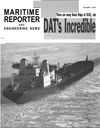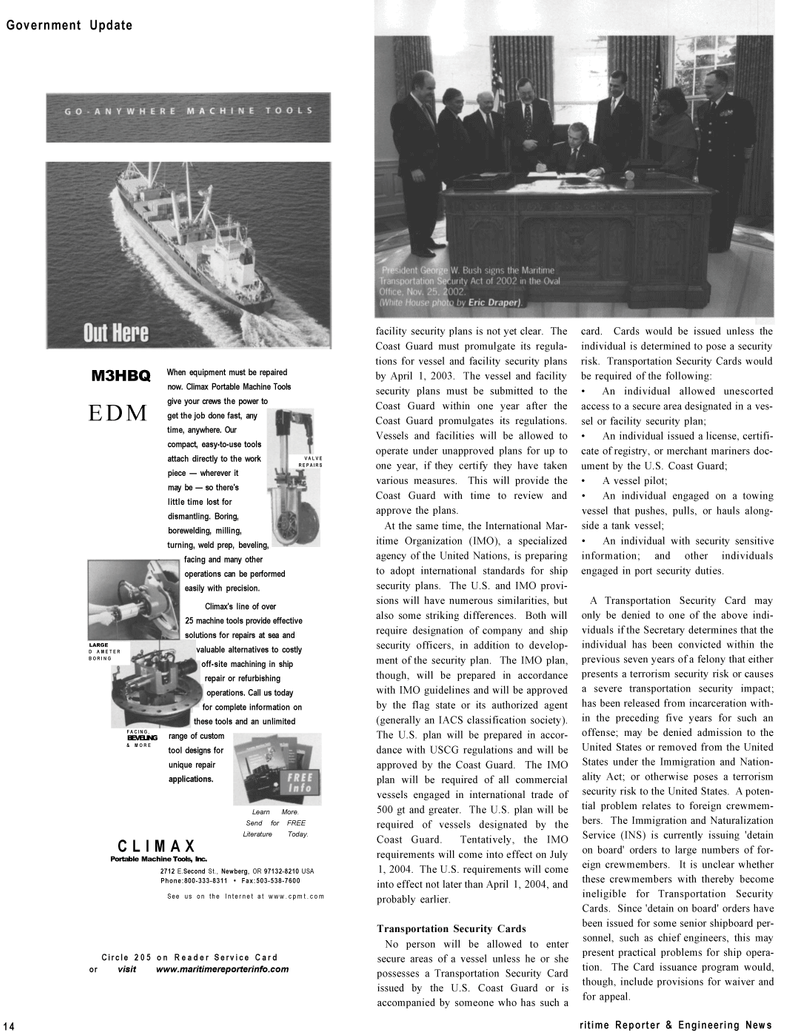
Page 14: of Maritime Reporter Magazine (December 2002)
Read this page in Pdf, Flash or Html5 edition of December 2002 Maritime Reporter Magazine
Government Update
See us on the Internet at www.cpmt.com
M3HBQ
EDM
VALVE
REPAIRS
LARGE
D AMETER
BORING
FACING,
BEVELING & MORE
When equipment must be repaired now. Climax Portable Machine Tools give your crews the power to get the job done fast, any time, anywhere. Our compact, easy-to-use tools attach directly to the work piece — wherever it may be — so there's little time lost for dismantling. Boring, borewelding, milling, turning, weld prep, beveling, facing and many other operations can be performed easily with precision.
Climax's line of over 25 machine tools provide effective solutions for repairs at sea and valuable alternatives to costly off-site machining in ship repair or refurbishing operations. Call us today for complete information on these tools and an unlimited range of custom tool designs for unique repair applications.
CLIMAX
Learn More.
Send for FREE
Literature Today.
Portable Machine Tools, Inc. 2712 E.Second St., Newberg, OR 97132-8210 USA
Phone:800-333-8311 • Fax:503-538-7600
Circle 205 on Reader Service Card or visit www.maritimereporterinfo.com 14 facility security plans is not yet clear. The
Coast Guard must promulgate its regula- tions for vessel and facility security plans by April 1, 2003. The vessel and facility security plans must be submitted to the
Coast Guard within one year after the
Coast Guard promulgates its regulations.
Vessels and facilities will be allowed to operate under unapproved plans for up to one year, if they certify they have taken various measures. This will provide the
Coast Guard with time to review and approve the plans.
At the same time, the International Mar- itime Organization (IMO), a specialized agency of the United Nations, is preparing to adopt international standards for ship security plans. The U.S. and IMO provi- sions will have numerous similarities, but also some striking differences. Both will require designation of company and ship security officers, in addition to develop- ment of the security plan. The IMO plan, though, will be prepared in accordance with IMO guidelines and will be approved by the flag state or its authorized agent (generally an IACS classification society).
The U.S. plan will be prepared in accor- dance with USCG regulations and will be approved by the Coast Guard. The IMO plan will be required of all commercial vessels engaged in international trade of 500 gt and greater. The U.S. plan will be required of vessels designated by the
Coast Guard. Tentatively, the IMO requirements will come into effect on July 1, 2004. The U.S. requirements will come into effect not later than April 1, 2004, and probably earlier.
Transportation Security Cards
No person will be allowed to enter secure areas of a vessel unless he or she possesses a Transportation Security Card issued by the U.S. Coast Guard or is accompanied by someone who has such a card. Cards would be issued unless the individual is determined to pose a security risk. Transportation Security Cards would be required of the following: • An individual allowed unescorted access to a secure area designated in a ves- sel or facility security plan; • An individual issued a license, certifi- cate of registry, or merchant mariners doc- ument by the U.S. Coast Guard; • A vessel pilot; • An individual engaged on a towing vessel that pushes, pulls, or hauls along- side a tank vessel; • An individual with security sensitive information; and other individuals engaged in port security duties.
A Transportation Security Card may only be denied to one of the above indi- viduals if the Secretary determines that the individual has been convicted within the previous seven years of a felony that either presents a terrorism security risk or causes a severe transportation security impact; has been released from incarceration with- in the preceding five years for such an offense; may be denied admission to the
United States or removed from the United
States under the Immigration and Nation- ality Act; or otherwise poses a terrorism security risk to the United States. A poten- tial problem relates to foreign crewmem- bers. The Immigration and Naturalization
Service (INS) is currently issuing 'detain on board' orders to large numbers of for- eign crewmembers. It is unclear whether these crewmembers with thereby become ineligible for Transportation Security
Cards. Since 'detain on board' orders have been issued for some senior shipboard per- sonnel, such as chief engineers, this may present practical problems for ship opera- tion. The Card issuance program would, though, include provisions for waiver and for appeal. ritime Reporter & Engineering News

 13
13

 15
15
